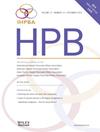Surgery for metastasis to the pancreas: systematic review of observational cohort studies
IF 2.4
3区 医学
Q2 GASTROENTEROLOGY & HEPATOLOGY
引用次数: 0
Abstract
Background
Pancreatectomy of metastases to the pancreas from other cancers is uncommon. Despite the rarity, several tumour entities have been described to metastasise to the pancreas and having undergone resection. The aim of this review was to collect studies reporting all-sites of origin and compare survival after pancreatectomy.
Methods
A systematic review of PubMed/Medline for observational studies from 2009 to 2025 reporting all-sites of origin with metastasis to the pancreas.
Results
Fifteen cohort studies with 613 pancreatectomies for metastases were reported, with 346 (56.4 %) from renal cell carcinoma (RCC). Among non-RCC indications, colorectal cancer (10.1 %) gynaecological cancers (7.3 %), sarcomas (6.3 %) and melanoma (4.6 %) were most frequent. Distal pancreatectomy was the most frequent procedure (63.7 %) followed by pancreatoduodenectomy (30 %) and total pancreatectomy (11.4 %). Other procedures including enucleations were done in in 8.3 %. Overall survival was best for pancreatectomy from RCC-metastasis, approaching 10 years median survival in the most recent studies, with a significant difference compared to all non-RCC indications.
Conclusion
Pancreatectomy for metastasis is reported with an increase in non-RCC origins. Distal pancreatectomy is performed in two-thirds. Long-term survival up to 10 years was reported after surgery for RCC. Considerably lower survival was reported in other primary cancer sites (PROSPERO#CRD42025633602).
胰腺转移手术:观察性队列研究的系统回顾。
背景:其他肿瘤转移到胰腺的胰腺切除术并不常见。尽管罕见,一些肿瘤实体已经被描述为转移到胰腺,并进行了切除。本综述的目的是收集报告所有起源部位的研究,并比较胰腺切除术后的生存率。方法:对2009年至2025年PubMed/Medline的观察性研究进行系统回顾,报告所有起源部位转移到胰腺。结果:15项队列研究报告了613例转移性胰腺切除术,其中346例(56.4%)为肾细胞癌(RCC)。在非rcc适应症中,最常见的是结直肠癌(10.1%)、妇科癌(7.3%)、肉瘤(6.3%)和黑色素瘤(4.6%)。远端胰腺切除术是最常见的手术(63.7%),其次是胰十二指肠切除术(30%)和全胰切除术(11.4%)。其他手术包括眼球摘除术的发生率为8.3%。在最近的研究中,rcc转移的胰腺切除术的总生存期最好,接近10年的中位生存期,与所有非rcc适应症相比有显著差异。结论:据报道,胰腺切除术转移与非肾细胞癌起源的增加。远端胰腺切除术占三分之二。据报道,RCC手术后的长期生存期可达10年。据报道,在其他原发性癌症部位的生存率要低得多(PROSPERO#CRD42025633602)。
本文章由计算机程序翻译,如有差异,请以英文原文为准。
求助全文
约1分钟内获得全文
求助全文
来源期刊

Hpb
GASTROENTEROLOGY & HEPATOLOGY-SURGERY
CiteScore
5.60
自引率
3.40%
发文量
244
审稿时长
57 days
期刊介绍:
HPB is an international forum for clinical, scientific and educational communication.
Twelve issues a year bring the reader leading articles, expert reviews, original articles, images, editorials, and reader correspondence encompassing all aspects of benign and malignant hepatobiliary disease and its management. HPB features relevant aspects of clinical and translational research and practice.
Specific areas of interest include HPB diseases encountered globally by clinical practitioners in this specialist field of gastrointestinal surgery. The journal addresses the challenges faced in the management of cancer involving the liver, biliary system and pancreas. While surgical oncology represents a large part of HPB practice, submission of manuscripts relating to liver and pancreas transplantation, the treatment of benign conditions such as acute and chronic pancreatitis, and those relating to hepatobiliary infection and inflammation are also welcomed. There will be a focus on developing a multidisciplinary approach to diagnosis and treatment with endoscopic and laparoscopic approaches, radiological interventions and surgical techniques being strongly represented. HPB welcomes submission of manuscripts in all these areas and in scientific focused research that has clear clinical relevance to HPB surgical practice.
HPB aims to help its readers - surgeons, physicians, radiologists and basic scientists - to develop their knowledge and practice. HPB will be of interest to specialists involved in the management of hepatobiliary and pancreatic disease however will also inform those working in related fields.
Abstracted and Indexed in:
MEDLINE®
EMBASE
PubMed
Science Citation Index Expanded
Academic Search (EBSCO)
HPB is owned by the International Hepato-Pancreato-Biliary Association (IHPBA) and is also the official Journal of the American Hepato-Pancreato-Biliary Association (AHPBA), the Asian-Pacific Hepato Pancreatic Biliary Association (A-PHPBA) and the European-African Hepato-Pancreatic Biliary Association (E-AHPBA).
 求助内容:
求助内容: 应助结果提醒方式:
应助结果提醒方式:


